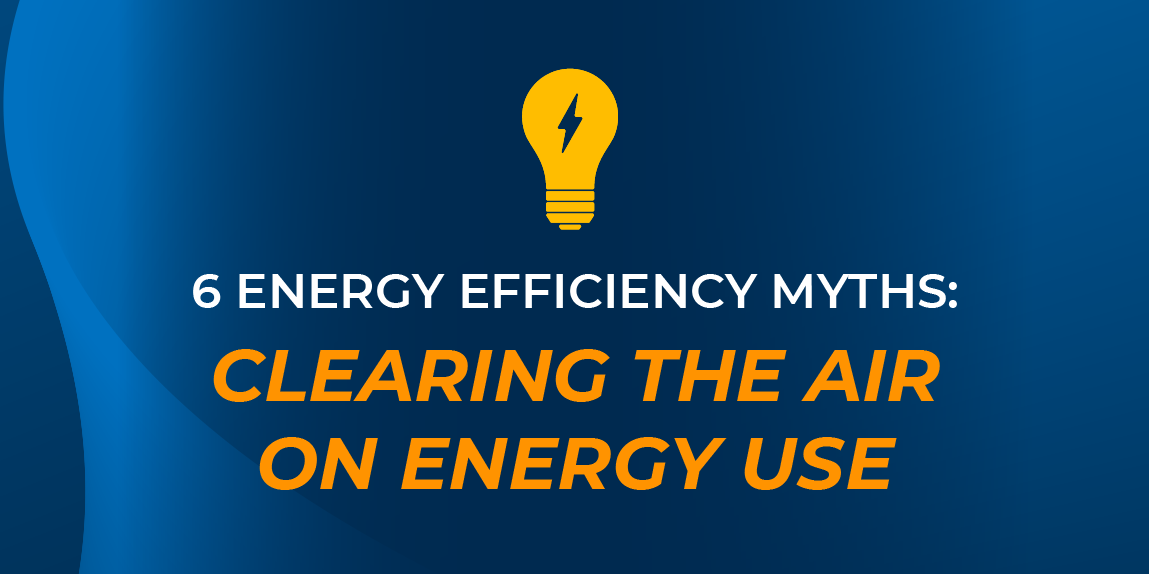6 Energy Efficiency Myths: Clearing the Air on Energy Use
Posted On: August 16, 2024

As the need for cost-effective electricity use continues to grow, energy efficiency has become more important than ever. However, there are plenty of myths and misconceptions that can masquerade as good advice, hindering your conservation efforts. Let's debunk the top 6 energy efficiency myths and replace them with options that can truly optimize your energy use.

Turning your computer on and off every day uses more energy than leaving it on.
This is false. Leaving your computer on 24/7 will draw more power over the course of a day than the relatively small surge it requires to boot up. It's best to just turn it off when you're done for the day.
Try this: If you don't want to completely shut down your system every day, you can adjust your computer's power settings. Set it to sleep after 15 minutes of inactivity, and to hibernate after an hour of inactivity. This will ensure that your computer won't use electricity after you walk away from your desk.

Closing vents in unused rooms saves energy on heating and air conditioning.
The premise seems sound — if you aren't heating or cooling as many rooms, the rest of the house should reach the desirable temperature quicker, right? Wrong. In reality, closing vents can disrupt air flow, create pressure and vent leaks, and actually make your HVAC system work harder, which can potentially increase energy usage.
Try this: Replace your HVAC filter every 1 to 3 months. You can also perform an energy audit on your home by inspecting all of your doors and windows to see if there are any air leaks or drafts in your home.

Energy-efficient appliances are too expensive.
While energy-efficient appliances may have a higher upfront cost, they can lead to significant savings throughout their lifespan by using less energy. Look for appliances with the ENERGY STAR® label, which indicates that they meet strict efficiency guidelines.
Try this: Google your older appliances and see how much energy they use in comparison to their newer, energy-efficient counterparts.

Setting the thermostat higher or lower will cool or heat your home faster.
Incorrect. Your HVAC system operates at a constant rate regardless of the temperature setting. Setting extremes on your thermostat won't cool or heat your home any faster. This can result in wasted energy and higher bills.
Try this: Set an efficient temperature (68 when it's cold, 74 when it's warm). Use a programmable or smart thermostat to adjust settings based on your schedule.

Hand-washing dishes saves more energy than using a dishwasher.
Don't make yourself do extra work for nothing. Nearly every modern dishwasher is designed with energy-efficient features. Hand-washing dishes makes sense only if you need to clean 2 to 3 dishes at a time. If you're staring at a full load of dishes in your sink, you can save both water and energy by using the dishwasher. After all, that's why they were invented.
Try this: To save even more energy, look up the recommended energy-efficient settings for your dishwasher model in your manual or online.

Ceiling fans can keep rooms cool, even if they're unoccupied.
In reality, ceiling fans have no effect on a room's temperature. They only make us feel cooler by moving the air around. Leaving ceiling fans on in an unoccupied room only wastes electricity.
Try this: Change the direction your ceiling fan spins depending on the temperature. In the summer, you'll want the blades spinning counter clockwise to push cool air down, and in winter, the blades should spin clockwise to force warm air up.
Switch to Stream Energy:
Stream Energy offers a compelling solution for people looking for affordable fixed-price electricity plans. By choosing Stream, you'll get a cost-effective energy plan designed to meet your needs.